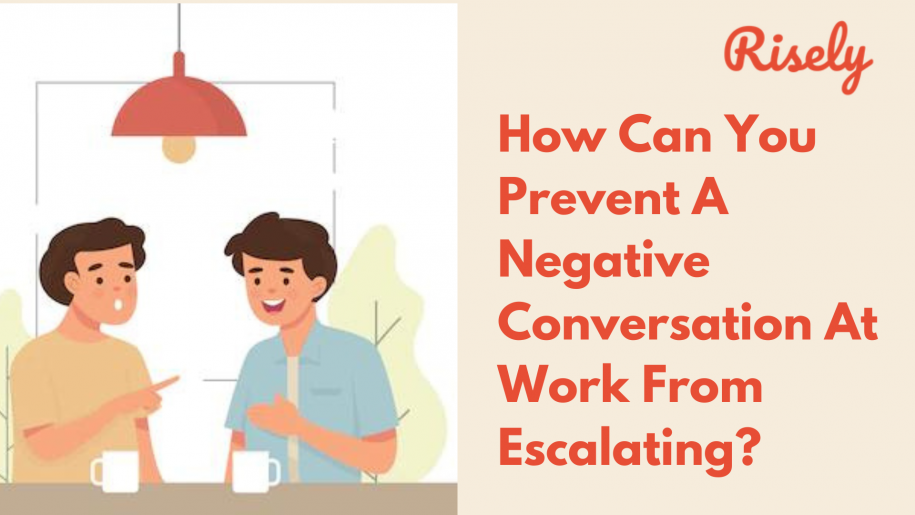How Can You Prevent A Negative Conversation At Work From Escalating?
Work can be a highly stressful environment, and the last thing you need is a negative conversation taking hold. With so much on the line, it’s important to take preventative measures to keep workplace tension at a minimum. By understanding the signs that a conversation is going wrong, you can start intervening before it deteriorates. Additionally, by learning to diffuse a tense situation quickly, you can avoid any negative repercussions from the conversation. Keep reading for more tips on how to keep your workplace running smoothly!What Is A Negative Conversation?
A negative conversation is any discussion that takes a negative turn. This can include argumentative conversations, debates, or heated discussions. A negative conversation is one in which one person talks down to the other and dominates the conversation. Negative conversations often build tension between people and can eventually lead to conflict. Moreover, handling a negative conversation can be challenging as it may involve difficult people who are not ready to listen or back down. These conversations can very often cross the boundary of toxicity as well. Therefore, it is important to recognize and prevent the escalation of negative conversations due to the maleficent impact they create.How Does A Negative Conversation Impact The Workplace?
Negative conversations often hurt the workplace. They can quickly spread through the workplace like wildfire. It can feel like there’s no stopping it, and the consequences can be dire. A negative conversation can have several negative effects on the workplace. For starters, it can cause tension and conflict between employees. This tension often sparks arguments and leads to misunderstandings. As a result, information is not always conveyed accurately, and communication becomes less effective overall. Furthermore, a negative conversation can drain morale as everyone starts to feel tense and stressed out. Beyond just impacting the work environment, a negative conversation can also impact employee productivity. When people feel down in the dumps, they’re less likely to be creative or productive at their jobs. Constant conflicts and arguments take away the energy utilized effectively at work. Additionally, poor communication is common due to heated discussions; this further delays tasks and disrupts workflow. The entire office atmosphere can quickly deteriorate when arguments break out due to disagreements during discussions. Ultimately, all of these negative effects can have a serious impact on the bottom line.Signs That A Conversation Is Going Bad
Negative conversations can quickly spiral out of control. If you’re worried about the potential for a negative conversation to turn into an argument, here are some signs that it’s happening:- You’re starting to feel angry and frustrated during the conversation.
- You have developed a negative perception of the person.
- The conversation is becoming too heated or uncomfortable.
- During the conversation, you start to feel like you can’t remember what was said or why it matters.
- The conversation has turned into a conflict without focus on its agenda.
- You feel anxious when approaching that conversation.
Other Interesting Reads
How To Prevent A Negative Conversation At Work From Escalating?
There’s nothing worse than a negative conversation at work that escalates. Whether the conversation is about a coworker’s bad attitude or a dispute over work-related issues, it can quickly become a battle. To avoid this, follow the given tips:Remember the goal of the conversation:
Be proactive and document the conversation as it happens. This will help both parties better understand the situation and decide on the best course of action. When you enter an argument, attempt to return to the original discussion with a calm mindset. You can try to present an idea differently to get it considered again.Be respectful:
If the conversation does get heated, don’t get into a fight – let the other person talk first. After they’ve had the chance to vent, respond calmly and diplomatically. And further, always remember the Golden Rule – treat others the way you want to be treated. Mutual respect is key to a healthy conversation. Moreover, you will need to empathize with their cause to understand their perspective better.Use good language:
Avoid using negative adjectives and expletives. They’ll only further inflame the situation. Instead, focus on discussing the problem clearly and concisely. If you see any misunderstanding brewing, clarify about the same. When you need to mention a negative adjective or phrase, be sure to put it in quotes so that your coworker knows you’re not saying those things.Do not return in kind:
If you find yourself getting defensive, try to refrain from returning the favor. This will only make things worse. Instead, try to stay calm and understanding throughout the conversation. If you find yourself at the receiving end of negative behavior, try extricating yourself from the scene. Getting further entrenched in the chaos will enlarge the negative impact only.Agree to disagree:
Sometimes disagreements are unavoidable – but try not to let them get out of hand. Remember at all times that you respect each other’s opinions, even if they differ from yours. Both parties should aim for a positive conversation that stays constructive and avoids major conflicts. Continue reading here for Effective Conflict Management Tips.Be open to listening:
Most importantly, be willing to listen. The other person may have something important to say that you didn’t realize. When you’re able to empathize with them, it will help pave the way for a productive conversation. Active listening will help you resolve issues way faster. Sometimes, a person to listen and understand might be all that is needed in the situation.Don’t take it personally:
Negative conversations can quickly spiral out of control. Do your best to remain detached from the situation. Stop and reassess the situation if you start to take things personally. It’s important not to get wrapped up in what could be a petty disagreement.Conclusion
A negative conversation at work can have serious consequences for both the individuals involved and the workplace. Knowing the signs that a conversation is going bad and how to prevent it from escalating can avoid any negative consequences. If a conversation does spiral out of control, try your best to diffuse the tension: be assertive and honest, listen attentively, and remember that everyone has a different perspective. Thanks for reading!Maneuver difficult situations better by mastering conflict management.
Download the free conflict management toolkit to understand typical conflicts and learn how to overcome them.
Other Related Blogs
How To Receive Feedback With A Growth Mindset?
How To Receive Feedback With A Growth Mindset? Receiving feedback is an essential part of personal and professional growth. But let’s be honest. We frequently struggle to accept feedback and…
5 Leadership Coaching Strategies You Need To Know
5 Leadership Coaching Strategies You Need To Know Leadership plays a crucial role in driving organizational success and growth. Effective leaders not only possess a strong vision and strategic thinking…
17 Leadership Coaching Topics You Need To Discuss
Leadership coaching topics have evolved, transitioning from traditional to more contemporary, transformative approaches. This evolution reflects a deeper understanding of what it takes to be an effective leader in today’s complex business…
6 Steps to Effective Performance Management Plans
6 Steps to Effective Performance Management Plans A solid performance management plan is essential for any organization to achieve its goals. It helps identify areas where employees need support, their…


